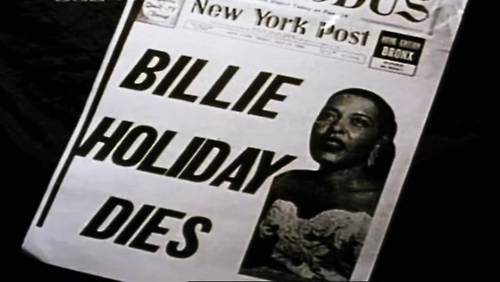Billie Holiday died aged 44 in a New York hospital at 3:10am on Friday 17 July 1959. Some failed to notice. The New York Times published a short obit, but only on page 15. But for those who cared about her and her music, the news was a bitter shock. One of them was Frank O’Hara, a New Yorker still barely known as a poet. He had a distinctive urban, allusive, witty style that could yet deliver a punch. This is the poem he wrote about his own experience of 17 July 1959:
The day Lady died
It is 12:20 in New York a Friday
three days after Bastille day, yes
it is 1959 and I go get a shoeshine
because I will get off the 4:19 in Easthampton
at 7:15 and then go straight to dinner
and I don’t know the people who will feed meI walk up the muggy street beginning to sun
and have a hamburger and a malted and buy
an ugly NEW WORLD WRITING to see what the poets
in Ghana are doing these days
I go on to the bank
and Miss Stillwagon (first name Linda I once heard)
doesn’t even look up my balance for once in her life
and in the GOLDEN GRIFFIN I get a little Verlaine
for Patsy with drawings by Bonnard although I do
think of Hesiod, trans. Richmond Lattimore or
Brendan Behan’s new play or Le Balcon or Les Nègres
of Genet, but I don’t, I stick with Verlaine
after practically going to sleep with quandarinessand for Mike I just stroll into the PARK LANE
Liquor Store and ask for a bottle of Strega and
then I go back where I came from to 6th Avenue
and the tobacconist in the Ziegfeld Theatre and
casually ask for a carton of Gauloises and a carton
of Picayunes, and a NEW YORK POST with her face on itand I am sweating a lot by now and thinking of
leaning on the john door in the 5 SPOT
while she whispered a song along the keyboard
to Mal Waldron and everyone and I stopped breathing
The poem’s title is explicit and straightforward enough, though O’Hara neatly inverts the nickname, Lady Day, given to her by her great jazz partner, Lester Young (who had died only four months earlier). We know – or think we know – what to expect. But death lies hidden, unknown and unmentioned, all the way through the poem, until it’s glimpsed, from the corner of an eye, in the fifth-from-last line.
Instead, the speaker gives us, in a free, conversational tone, a detailed narration (linked paratactically by numerous ‘and’s, and no full stops) of what he’s up to during his lunch hour that day. (O’Hara worked at the Museum of Modern Art (MoMA), so he’s somewhere in midtown Manhattan.) The tense is the present, but maybe he’s recalling the day from sometime later (‘yes, it is 1959’). Times here are precise: 12:20 for the shoeshine, and, later that day, 4:19 to catch the train to East Hampton on Long Island, for an invited meal (Michael Goldberg and Patsy Southgate were real people, painter and writer/translator respectively).
As he ticks off the lunchtime jobs – some mundane, some less so – we start to build a picture of the poet. Ordinary enough to start with (the shoeshine, the hamburger and malted milkshake, the bank, the gifts for evening hosts), and with a sense of humour (Miss Stillwagon who fails, for once, to check his bank balance). But also a person with ostentatiously broad and up-to-the-minute cultural appetites (‘to see what the poems in Ghana are doing these days’) – to the extent of giving every appearance of being an dithering aesthete (‘practically going to sleep with quandariness’ over which book to buy for Patsy).
The final stop is back in 6th Avenue, the home of MoMA, to buy cigarettes – French cigarettes, recalling Bastille Day at the start – and then, at last, the copy of the New York Post ‘with her face on it’.
With that short phrase the poem turns 180°. The leisurely wandering (‘I walk’, ‘I go’, ‘I just stroll’) stops abruptly. The trivial decisions and choices, of what to do or eat or buy, are swept aside. The world’s productions – French authors and cigarettes, Greek poems, Irish plays, Italian liqueurs – may converge on the Manhattan consumer, but now only one, local New York event matters. That one photo of Billie is enough to wipe away the lunch hour’s frivolity. ‘I am sweating a lot by now’, says the poet. We know it’s warm day – ‘the muggy street beginning to sun’ – but this sweat is sudden and cold.
Immediately O’Hara’s mind turns back from the present to the memory of a single past event, the last time he saw Billie Holiday performing. It was in the Five Spot Café, a jazz club in the Bowery, where ‘she whispered a song along the keyboard / to Mal Waldron’. Mal Waldron was Billie’s regular pianist during her final years, when her health was failing and her voice weaker. Her hunched ‘whisper’ is both romantic and strained. O’Hara watches, ‘leaning on the john door’ (caught short or seeking a better view) and is transfixed by the experience: ‘and everyone and I stopped breathing’ (‘everyone and I’ is another of O’Hara’s inversions). Lady Day’s breath may have ceased on 17 July, but the lasting memory of her singing with Waldron seems to bypass Death.
These last four lines of elegy – economic, reticent, ecstatic – gain their power from the extreme contrast with the flânerie and whimsicality of the earlier verses. There can’t be many poems that counterpoint death and daily life so acutely.






Leave a Reply